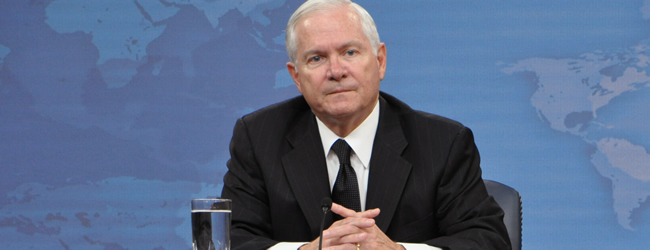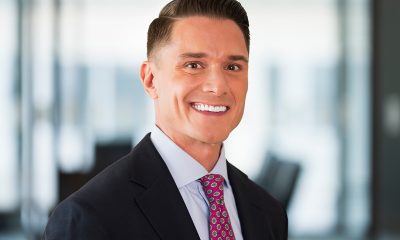National
Report finds limited difficulty in lifting ‘Don’t Ask’
Gates urges Congress to repeal ban by year’s end


Defense Secretary Robert Gates has renewed his call for Congress to repeal "Don't Ask, Don't Tell" by the year's end. (Blade photo by Michael Key)
The Pentagon on Tuesday released its long-awaited “Don’t Ask, Don’t Tell” report — which found open service can be implemented in the armed forces with limited disruption to the military — as Defense Secretary Robert Gates renewed his call for Congress to repeal the gay ban by the year’s end.
“Now that we have completed this review, I strongly urge the Senate to pass this legislation and send it to the president for his signature before the end of this year,” Gates said during a news conference.
Gates continued that legislative repeal of “Don’t Ask, Don’t Tell” is a “matter of some urgency” because of pending litigation that could strike down the statute.
“It is only a matter of time before the federal courts are drawn once more into the fray with the very real possibility that this change would be imposed immediately by judicial fiat — by far the most disruptive and damaging scenario I can imagine,” Gates said.
Still, the defense secretary also said the military would need some time to prepare for open service even after Congress repeals the statute. Gates noted that pending legislation before Congress would end “Don’t Ask, Don’t Tell” only after he, the president and the chairman of the Joint Chiefs of Staff certify that the U.S. military is ready for repeal.
“I believe it would be unwise to push ahead with full implementation of repeal before more can be done to prepare the force — in particular, those ground combat specialties and units for what could be a disruptive and disorientating change,” Gates said.
Gates said he doesn’t know how long it would take for the U.S. military to make the changes necessary before he can certify that open service can happen in the military. Still, Gates said if Congress enacts repeal, President Obama would be “watching very closely that we don’t dawdle or try to slow-ball this.”
“I think his expectation would be that we prepare as quickly as we properly and comprehensively could, and then we’d be in a position to move toward certification,” Gates said. “But how long it would take, I don’t know.”
For the first time, Gates also expressed his personal opposition to “Don’t Ask, Don’t Tell” because the law comprises the integrity of gay service members.
“One of the things that is most important to me is personal integrity,” Gates said. “A policy or a law that in effect requires people to lie gives me a problem.”
Majority of troops don’t care about gays in military
The defense secretary made his remarks as part of his endorsement of the Pentagon report, which found little potential disruption in lifting the military’s gay ban should Congress repeal “Don’t Ask, Don’t Tell.”
Gates said the findings of the report “reflect nearly ten months of research and analysis along several lines of study” and “represent the most thorough and objective review ever of this difficult policy issue and its impact on the American military.”
Chairman of the Joint Chiefs Adm. Mike Mullen, who also took part in the news conference, said he also fully backs the report. Mullen has already testified before the Senate that supports open service in the U.S. military.
“For the first time, the chiefs and I have more than just anecdotal evidence and hearsay to inform the advice we give our civilian leaders,” Mullen said.
In the executive summary for the 256-page report, the “Don’t Ask, Don’t Tell” working group co-chairs Jeh Johnson, the Pentagon’s general counsel, and Army Gen. Carter Ham, commander of U.S. Army Europe, write that based on their findings, the risk of repeal “to overall military effectiveness is low.”
“We conclude that, while a repeal of Don’t Ask, Don’t Tell will likely, in the short term, bring about some limited and isolated disruption to unit cohesion and retention, we do not believe this disruption will be widespread or long-lasting, and can be adequately addressed by the recommendations we offer below,” Johnson and Ham write.
The report includes the results of a survey sent to 400,000 service members over the summer to solicit their views of gays serving openly in the military. According to the report, more than 115,000 of the surveys, or about 28 percent, were returned.
As earlier reported in November by the Washington Post, 70 percent of service members said alongside an openly gay person would have positive, mixed or no effect on their unit’s ability to get the job done.
The survey also found that 69 percent of respondents believe they have served alongside someone they believed to be gay. Of these respondents, 92 percent said their unit’s ability to work together was either very good, good or neither good nor poor.
Still, the survey found a significant minority who predicted negative consequences as a result of repeal — most notably in the Marine Corps.
While 30 percent of survey respondents overall had negative views on open service, around 40 to 60 percent of respondents in the Marine Corps and others in various combat arms specialties expressed concerns about serving alongside openly gay people.
During the briefing, Gates said this discontent with repeal among these groups has made the service chiefs of the Army, Air Force, Navy and Marine Corps “less sanguine” about the prospects on open service. Each of these service chiefs were set to testify on Friday before the Senate on the views on the report.
Still, Gates said the views on the combat troops on implementing open service “do not present an insurmountable barrier” to repeal of “Don’t Ask, Don’t Tell.”
“However, these findings do lead me to conclude that an abundance of care and preparation is required if we are to avoid a disruptive and potentially dangerous impact on the performance of those serving at the tip of the spear in America’s wars,” Gates said.
Implementing open service
Accompanying the larger report is an 87-page support plan to guide implementation of open service in the U.S. military. The guide emphasizes that the key implementation message for successful repeal is “leadership-professionalism-respect.”
For leadership, the guide states that leaders in the chain of command must set the example for open service. For professionalism, the guide advises leaders to remind service members of their obligations and oath to defend the U.S. Constitution. For respect, the guide states that unit strength derives from treating other service members with respect.
The report also notably states the building separate rooming quarters for gay and straight service members won’t be appropriate for implementing open service.
“Building separate facilities would create divisions within units and inappropriately isolate a portion of the force,” the support plan states.
In March, former Marine Corps Commandant Gen. James Conway has raised the idea of separate quarters when he said they might be necessary in his service as a result of open service. The Marine Corps is unique among other services because Marines bunk together on base in the same room.
Despite the recommendation against building separate quarters, Johnson said during the Tuesday news conference that commanding officers may be able to make different housing arrangements from service members as result of open service in some circumstances.
“We’re noting that commanders should retain the discretion on an individualized case-by-case basis to address concerns, particular concerns about privacy,” Johnson said. “And this is discretion they have right now. If a service member has a particular concern about an issue with privacy or can’t get along with someone with whom he’s been assigned a room, a commander has discretion to deal with that.”
The guide also makes recommendations for partner benefits for gays serving in the military. Ham said if “Don’t Ask, Don’t Tell” is repealed, the U.S. military would only to continue to observe federally recognized marriages, which would be in accordance with the Defense of Marriage Act.
Still, Ham said a repeal of “Don’t Ask, Don’t Tell” would mean the same-sex partners of service members would be entitled to hospital visitation rights and death benefits.
“With regard to the hospital visits and death gratuities and the like, if the law is repealed, then we believe that are a number of benefits to which servicemembers are entitled that are servicemember-designated,” Ham said. “And we believe that the examples that you offer would likely fall into that category.”
New York
N.Y. lawmaker vows ‘Pride flag will fly again’ at Stonewall Monument
After a Jan. 21 policy shift, Pride flags were banned at national parks, prompting backlash from Bottcher and LGBTQ advocates.

Hours after news broke that the National Park Service would no longer allow Pride flags to fly at the Stonewall National Monument — the birthplace of the modern LGBTQ rights movement in the United States — the Washington Blade spoke with New York State Sen. Erik Bottcher, who represents the area surrounding the Stonewall Inn and the national monument.
During the interview, Bottcher, who is gay, spoke about the policy change and outlined steps he plans to take in the coming days to push for its reversal.
“This is another act of erasure,” Bottcher told the Blade. “It’s a cowardly attempt to rewrite history and to intimidate our community. This is Stonewall — it’s where we fought back, where we ignited a global movement for equality — and we refuse to go back. We’re not going to accept these acts of erasure.”
The Stonewall Inn became a flashpoint in 1969 after NYPD officers raided the bar, part of a longstanding pattern of police harassment of LGBTQ spaces. The raid sparked days of protest and resistance along Christopher Street, now widely recognized as the catalyst for the modern LGBTQ rights movement.
While the events are often referred to as the “Stonewall Riots,” many activists and historians prefer the term “Stonewall Uprising,” emphasizing that the resistance was a response to systemic oppression rather than senseless violence. LGBTQ patrons and community members fought back — shouting “Gay Power!” and “Liberate Christopher Street!” — as crowds grew and frustration with police abuse boiled over.
Since the uprising, LGBTQ people and allies have gathered annually in June to commemorate Stonewall and to celebrate Pride, honoring the movement that placed LGBTQ voices at the center of the fight for equality.
In June 2016, then President Barack Obama officially designated the space as the Stonewall National Monument, making it the United States’s first national monument designated for an LGBTQ historic site.
Now, nearly 10 years later, President Trump’s appointed NPS acting director Jessica Bowron changed policy on Jan. 21 regarding which flags are allowed to be flown in national parks. Many, including Bottcher, say this is part of a larger targeted and deliberate attempt by the administration to erase LGBTQ history.
“It’s clear they’re making a conscious decision to erase the symbols of our community from a monument to our community’s struggle,” he said. “This is a calculated and premeditated decision, and it could be — and should be — reversed.”
“Let’s be clear,” Bottcher added, “they wish we didn’t exist … But we’re not going anywhere. We refuse to go back into the shadows.”
When asked why it is critical to challenge the policy, Bottcher emphasized the importance of visibility in preserving LGBTQ history.
“This is why it’s so important that we not let this stand,” he said. “Visibility is critical. When people see us, learn about us, and get to know us, that’s how we break down prejudice and stereotypes. We cannot allow them to push us back into the shadows.”
Other LGBTQ leaders and elected officials were quick to condemn the removal of the Pride flag, which had flown since the site’s official designation as a national monument.
New York City Mayor Zohran Mamdani called the decision “outrageous.”
“I am outraged by the removal of the Rainbow Pride Flag from Stonewall National Monument,” Mamdani said in a statement. “New York is the birthplace of the modern LGBTQ+ rights movement, and no act of erasure will ever change or silence that history.”
“Our city has a duty not just to honor this legacy, but to live up to it,” he added. “I will always fight for a New York City that invests in our LGBTQ+ community, defends their dignity, and protects every one of our neighbors — without exception.”
Senate Minority Leader Chuck Schumer also condemned the move.
“The removal of the Pride Rainbow Flag from the Stonewall National Monument is a deeply outrageous action that must be reversed immediately,” Schumer said in a statement to The Advocate. “Stonewall is a landmark because it is the birthplace of the modern LGBTQ rights movement, and symbols of that legacy belong there by both history and principle.”
Cathy Renna, communications director for the National LGBTQ Task Force, said the flag’s removal will not erase the movement it represents.
“They can take down a flag, but they can’t take down our history,” Renna said. “Stonewall is sacred ground rooted in resistance, liberation, and the legacy of trans and queer trailblazers who changed the course of history.”
Human Rights Campaign National Press Secretary Brandon Wolf echoed that sentiment.
“Bad news for the Trump administration: these colors don’t run,” Wolf said. “The Stonewall Inn and Visitors Center are privately owned, their flags are still flying high, and that community is just as queer today as it was yesterday.”
Tyler Hack, executive director of the Christopher Street Project, said the removal was aimed squarely at LGBTQ visibility.
“The Pride flag was removed from Stonewall for one reason: to further erase queer and trans people from public life,” Hack said. “Stonewall marks the moment when queer and trans people fought back and demanded dignity. Our history is not theirs to erase.”
Bottcher closed with a promise to his constituents — and to the broader LGBTQ community — that the Pride flag’s removal would not be permanent.
“We will not be erased. We will not be silenced,” he said. “And the Pride flag will fly again at the birthplace of our movement.”
Florida
Disney’s Gay Days ‘has not been canceled’ despite political challenges
GayDays is moving forward with its planned LGBTQ meet-up

Gay Days in Orlando is preparing for its 2026 gathering though organizers have yet to release full details.
Concerns emerged about the status of the annual meetup of LGBTQ people at Walt Disney World in Orlando, Fla., after social media posts and multiple news outlets reported the event would not take place this year.
In response to inquiries from the Blade, Josh Duke, co-owner of Gay Days, clarified that an update would come this week.
“At this time, I’d like to clarify that Gay Days Orlando has not been canceled,” an email to the Blade said. “We are currently finalizing details regarding our plans for 2026 and will be making an official announcement later this week.”
Earlier this week, Gay Days posted about a pause in their plans for the annual meeting, which quickly gained traction online.
In an official statement on social media, Gay Days organizers cited several factors behind what had initially appeared to be a cancellation of their 2026 event.
“Changes to our host hotel agreement, the loss of key sponsorship support, and broader challenges currently impacting LGBTQIA+ events nationwide made it impossible to deliver the experience our community deserves,” organizers wrote. However, the statement added, “This is a pause — not an ending.”
In a longer message shared with supporters, organizers elaborated on that now-reversed decision.
“Gay Days Family — it is with very heavy hearts that we share Gay Days 2026 will not take place this year. This was an incredibly difficult decision and one that was only made after every possible option was explored.
“Gay Days has always been more than an event — it is community, family, and a place where so many memories are made. While this pause is painful, it also gives us the opportunity to step back, listen, and begin shaping a stronger and reimagined GayDays for the future. Thank you for your continued love, patience, and support. This is not goodbye — it’s a reset, and we look forward to creating the future of GayDays together.”
GayDays, which began in 1991, encourages queer Disney fans to visit the Orlando theme park while wearing red shirts to identify one another. Originally focused on gay men reclaiming the childhood joy often denied due to homophobia, the event has expanded over the years to include LGBTQ+ families on summer vacations and queer couples honeymooning in the Magic Kingdom.
Disney made history in 2019 by holding its first-ever official Pride event at its European park, Disneyland Paris. In 2023, Disneyland California hosted the first U.S. official Pride event.
Concerns about the potential cancellation had arisen amid broader challenges affecting LGBTQ events nationwide. These include changes in hotel agreements, sponsorship support, and Florida’s increasingly restrictive anti-LGBTQ policies under Gov. Ron DeSantis. Florida currently has an equality score of -3.00 out of 49 from the Movement Advancement Project, which evaluates states based on policies affecting relationship and parental recognition, nondiscrimination, religious exemptions, LGBTQ youth, healthcare, criminal justice, and transgender identity documentation.
Recent legislation in Florida has included prohibitions on hormone replacement therapy for transgender minors, restrictions on adult access to treatment, bans on drag performances for those under 18, bathroom bans for transgender people in state buildings, and expansion of the Parental Rights in Education Act, commonly called the “Don’t Say Gay” law. These measures limit public school instruction or discussion about sexual orientation and gender identity.
Gay Days Anaheim is scheduled to take place at Disneyland Resort in September.
Disney has also maintained a focus on Pride, reporting in 2022 that proceeds from Pride merchandise benefited numerous LGBTQ organizations, including GLSEN, PFLAG, The Trevor Project, Zebra Coalition, the Los Angeles LGBT Center, the LGBT Center Orange County, the San Francisco LGBT Center, and the Ali Forney Center. Pride merchandise sold internationally supports local LGBTQ organizations in those regions.
More details about this event are expected to be released on Friday.
New York
Pride flag removed from Stonewall Monument as Trump targets LGBTQ landmarks
The new NPS policy targets Pride flags amid consistent efforts from the Trump administration to minimize LGBTQ history.

A rainbow Pride flag flying at the Stonewall National Monument in New York was removed at the direction of Trump administration officials at the National Park Service, according to a source familiar with the matter who spoke to the Blade on condition of anonymity.
The source said the move had been in the works for weeks and is part of ongoing efforts by the Trump-Vance administration to erase LGBTQ identity from federally controlled landmarks.
In response to the Blade’s request for information about the new flag policy, the National Park Service provided the following statement:
“Current Department of the Interior policy provides that the National Park Service may only fly the U.S. flag, Department of the Interior flags, and the Prisoner of War/Missing in Action flag on flagpoles and public display points. The policy allows limited exceptions, permitting non-agency flags when they serve an official purpose. These include historical context or reenactments, current military branch flags, flags of federally recognized tribal nations affiliated with a park, flags at sites co-managed with other federal, state, or municipal partners, flags required for international park designations, and flags displayed under agreements with U.S. Citizenship and Immigration Services for Naturalization ceremonies.”
The statement also included official guidance on the display of non-agency flags issued by Trump-appointed National Park Service Director Jessica Bowron.
The Blade reached out to other organizations to confirm the status of the Pride flag last week, including the Stonewall National Monument Visitor Center, the NYC Landmarks Preservation Commission, and the National Parks Conservation Association. None were able to provide details about whether the flag was still flying at that time but it has since been removed.
This action aligns with other moves targeting and erasing LGBTQ history. In September, the Blade reported that three organizations originally slated to receive more than $1.25 million from the National Park Service’s Underrepresented Communities Grant Program would no longer receive funding: In Washington, D.C., the Preservation League had been awarded $75,000 to document LGBTQ+ historic resources. In Providence, R.I., the Preservation Society was slated for $74,692 to conduct an LGBTQ+ survey and prepare a National Register nomination. And in New York, the Fund for the City of New York, Inc., had been awarded $32,000 to nominate the residence of Bayard Rustin — the iconic civil rights and LGBTQ activist — as a National Historic Landmark.




















